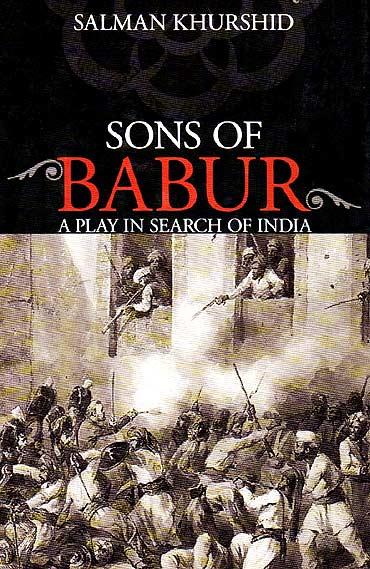 Yoginder Sikand reviews Salman Khurshid's Sons of Babur -- A play in search of India.
Yoginder Sikand reviews Salman Khurshid's Sons of Babur -- A play in search of India.
'Sons of Babur have only two places: the graveyard or Pakistan!' went the bloodcurdling cry of Hindutva fascists, seeking to whip up Hindu hatred against Muslims in the course of their movement to destroy the Babri Masjid two decades ago.
For these venom-spewing fanatics, the Indian Muslims simply had no place in India at all. They were, they alleged, the progeny of foreign invaders. They linked them up with one such Muslim invader -- but, curiously, not the first, and certainly not the most brutal of them -- Zahiruddin Mohammad Babur, the founder of the Mughal dynasty.
That their claim was, historically speaking, wide off the mark -- the vast majority of Indian Muslims being descendants of local converts -- was something that they did not seem to care about in the least.
This wonderfully-crafted play is a powerful rebuttal of Hindutva propaganda about the Indian Muslims being 'aliens' or the progeny thereof. Without sounding preachy, and not seeking to whitewash the darker aspects of Mughal rule, Khurshid presents the complexity of inter-communal relations under the Mughals, highlighting the fact that, over time, the Mughals had so closely integrated themselves into the wider Indian society that it makes no sense whatsoever to consider them to have been aliens or foreigners.
He does not shy from dealing with the murky politics of several Mughal potentates -- their lust for power and pelf, which even led father to kill sons or sons to plot against fathers, and the harsh policies of some of them towards their non-Muslim subjects. Khurshid does not condone all of this, but appeals to us to view these figures as creatures of their times and not judge them according to contemporary standards.
The play revolves around a group of college students at the height of the Hindutva agitation to tear down the Babri Masjid. Confronted with rival claims about Indianness and Indian history, in particular the role of the Muslims in all of this, one of the students, Rudranshu Mitra, travels in his mind all the way to Rangoon where he has a series of extended conversations with the last Mughal Emperor, Bahadur Shah Zafar, who lies buried in a decrepit grave in the Myanmarese capital.
The Emperor takes Mitra on a series of voyages through the past, where he meets Babur and a host of other Mughal rulers. From them he learns of how the Mughals, who left their desolate Central Asian home, managed, over the years, not just to adapt to India but also help create the very idea of India as we understand it today. Khurshid presents Bahadur Shah Zafar as exemplifying that very idea in his own person, as a symbol that united Hindus and Muslims against British rule.
Khurshid's attempt to salvage the Mughals from Hindutva abuse does serve a valuable political purpose, of course. But to present Zafar as the herald of the idea of India seems completely far-fetched. Were Zafar and a host of Hindu and Muslim rulers who lent their weight to the revolt of 1857 really passionate proto-nationalists, as Khurshid would have them be? Or, as seems more likely, were they simply out to protect their tottering regimes?
And were they as beneficent as Khurshid projects them as? True, they did have a role to play a role in the evolution of a sort of Indo-Muslim cultural synthesis, but what, one must ask, did they at all do for the oppressed masses, Hindus and Muslims alike? Defending them from Hindutva falsehood is fine, and indeed laudable, but to extol them as passionately committed to their subjects (particularly the poor, on whose bruised shoulders the entire edifice of their splendour rested) is surely a bit too much.
That said, the play makes wonderful reading. One would not have expected an Indian politician, and a minister at that (Khurshid is minister of state for corporate and minority affairs) to be such a gifted wordsmith.
Sons of Babur A play in search of India by Salman Khurshid. Published by Rupa & Co. Price: Rs. 295.






 © 2025
© 2025